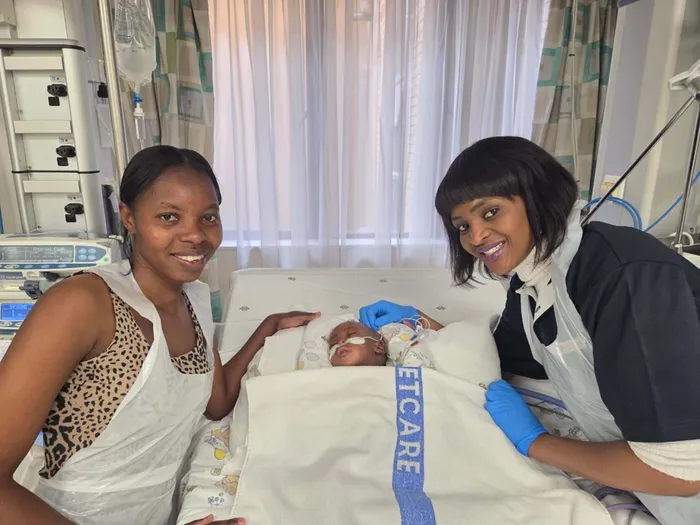Miracle baby trumps heart defect through community and medical collaboration
Miracle baby

JUST three days after her procedure, Xihluke was well enough to go home with her parents, and has been eating well and growing quickly ever since.
Image: Supplied.
A BABY girl born prematurely at just 30 weeks is now thriving after overcoming a life-threatening congenital heart defect, thanks to an extraordinary display of medical teamwork and the fervent prayers of her family and community.
Xihluke Mashimbyi, named for her uniqueness, has become a symbol of hope and resilience for her parents, Oddette and Dzunisani. “She is our miracle angel,” Oddette explains emotionally. “This is our second child, but we never imagined facing such severe health challenges with an infant.”
Her journey to recovery began at the Maboneng Heart and Lung Institute at Netcare Sunninghill Hospital.
There, a dedicated team of specialists volunteered their expertise pro bono to help resolve the congenital heart issue that had left baby Xihluke fighting for her life.
The operation was made possible by the Netcare Foundation's commitment to supporting children in need of critical medical interventions.
Oddette recalls the challenging start to Xihluke's life. “From the moment she was born, she needed to be on a ventilator in the intensive care unit. Every day, I visited her to express milk, hoping she would grow stronger.”
Despite her determined efforts, Xihluke struggled to gain weight like a typical baby.

RELIEVED mother Oddette Mashimbyi and registered nurse Sr Dudu Raseboka are pictured with Xihluke as she recovers at Netcare Sunninghill Hospital following her specialised VSD closure procedure, made possible by the Netcare Foundation and the Maboneng Heart and Lung Institute with doctors providing their lifesaving expertise pro bono.
Image: Supplied.

RELIEVED mother Oddette Mashimbyi and registered nurse Sr Dudu Raseboka are pictured with Xihluke as she recovers at Netcare Sunninghill Hospital following her specialised VSD closure procedure, made possible by the Netcare Foundation and the Maboneng Heart and Lung Institute with doctors providing their lifesaving expertise pro bono.
Image: Supplied.
“Feeding her was a labour of love. I had to be so careful, providing only small amounts, or else she would vomit,” she added, reflecting on the couple's grim reality.
Concern escalated when tests at the Steve Biko Academic Hospital revealed that Xihluke had a ventricular septal defect, a hole in the wall separating the heart’s chambers. “We were terrified,” Dzunisani admitted. “Hearing the word ‘operation’ sounded even worse, but it became clear that it was our only hope.”
“The issue of heart disease in children is significant, and there are not enough specialists to tackle it,” explained Professor Lindy Mitchell, a paediatric cardiologist at Steve Biko Academic Hospital, detailing the urgency of Xihluke's case. “The Maboneng Foundation and the Netcare Foundation were approached to see if they could facilitate the procedure quickly.”
Dr Erich Schürmann, a cardiothoracic surgeon and co-founder of the Maboneng Heart and Lung Institute, highlighted the condition’s time-sensitive nature: “This type of defect, if left untreated, can damage the lungs over time, so it needed immediate attention.”
A dedicated team — including Dr Lehlohonolo Dongo and Dr Martin Myburgh, alongside paediatric cardiologist Dr Kenny Govendrageloo and anaesthetist Dr Stephanie Fischer — performed the intricate heart surgery on Xihluke at Netcare Sunninghill Hospital.
The Mashimbyi family awaited the outcome with a mix of hope and anxiety. “We put our trust in the surgeons. It’s a major procedure, and Xihluke is so small,” Oddette recalled. “However, our prayers were answered; she responded brilliantly to the operation and was recovering well.”
Just three days after her surgery, little Xihluke was able to return home with her family. “She began to thrive almost immediately. Her weight improved, and she developed a taste for pumpkin and maize meal porridge with peanut butter,” Dzunisani shared, relieved and grateful.
The couple acknowledges the vital role played by the doctors and nurses in saving their daughter’s life. “We are immensely thankful for the kindness and skill of the medical teams at both hospitals and the efforts of the Netcare and Maboneng Foundations for giving our daughter a second chance,” Dzunisani expressed.
Mande Toubkin, Netcare’s general manager of emergency, trauma, transplant, and CSI, praised the collaboration between public and private sectors that made Xihluke’s surgery possible.
“Through initiatives like this, we can reach more children and truly change lives. Other organisations should consider the profound impact of health-focused initiatives on individuals and communities alike,” she concluded.
If you wish to support the lifesaving initiatives that have helped children like Xihluke, explore the Maboneng Foundation at http://www.mabonengfoundation.co.za/.